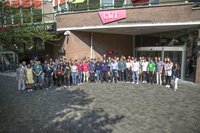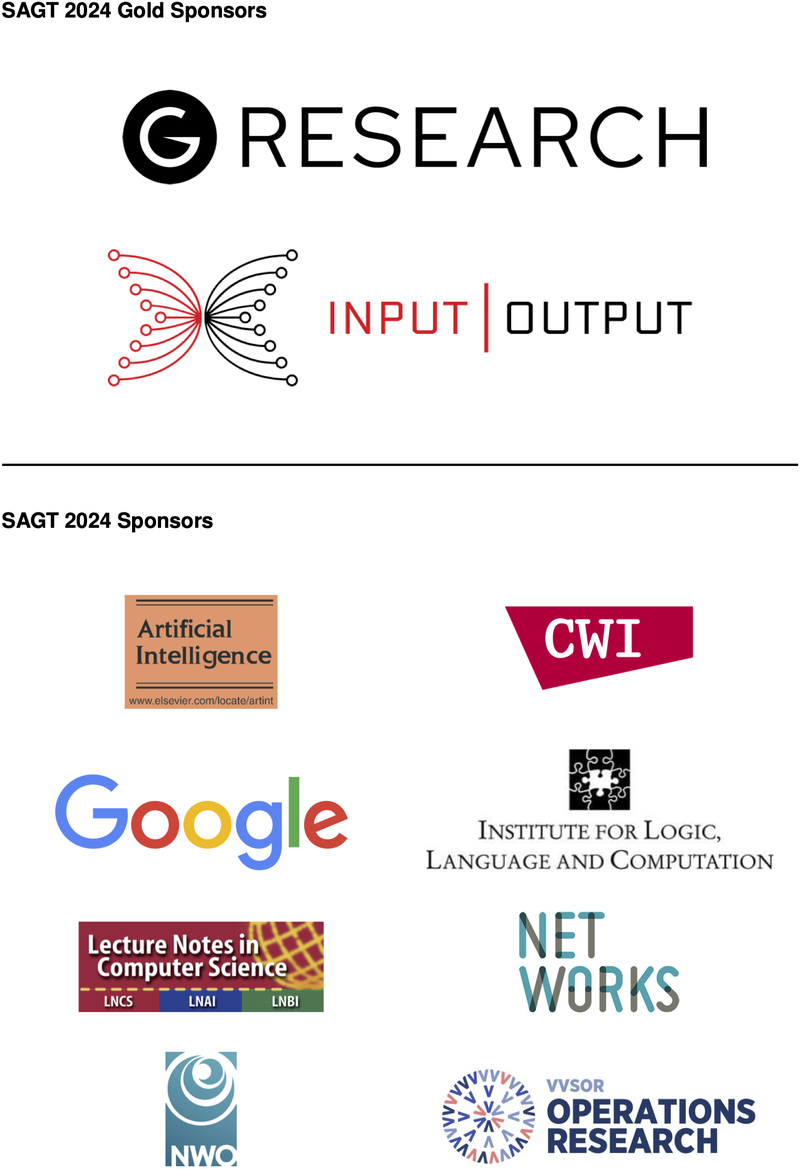The SAGT 2024 booklet containing the complete scientific program together with more detailed information about the planned events is available as PDF: here.
Tuesday, September 3, 2024: Tutorial Day
09:00 - 10:00 Registration - Coffee
10:00 - 11:00 Tutorial 1A: Proportionality in Multi-Winner Voting: Axioms, Voting Rules and Equilibria - Jan Maly. (Chair: Guido Schäfer)
11:00 - 11:30 Coffee
11:30 - 12:30 Tutorial 1B: Proportionality in Multi-Winner Voting: Axioms, Voting Rules and Equilibria - Jan Maly. (Chair: Guido Schäfer)
12:30 - 13:30 Lunch
13:30 - 14:30 Tutorial 2A: Prophet Inequalities with Limited Information - Rebecca Reiffenhäuser. (Chair: Carmine Ventre)
14:30-15:00 Coffee
15:00-16:00 Tutorial 2B: Prophet Inequalities with Limited Information - Rebecca Reiffenhäuser. (Chair: Carmine Ventre)
16:00 - 16:30 Coffee
16:30 - 18:00 LightNLing Talks (Chair: Guido Schäfer)
- An Improved Bound for the Price of Anarchy for Related Machine Scheduling
Arman Rouhani - Fair Division with Minimal Withheld Information in Social Networks
Ivan Bliznets - Distributionally Robust Monopoly Pricing: Switching from Low to High Prices in Volatile Markets
Tim van Eck - The Secretary Problem with Independent Sampling
Tim Oosterwijk
18:00 - 19:00 Reception
Wednesday, September 4, 2024: Conference Day 1
09:00 - 10:00 Registration - Coffee
10:00 - 10:10 Opening
10:10 - 11:10 Invited Talk: Actually, Data is a Rival Good - Katrina Ligett (Chair: Carmine Ventre)
11:10 - 11:40 Coffee break
11:40 - 13:00 Session 1: Matching. (Chair: Rebecca Reiffenhäuser)
- Ex-post Stability under Two-Sided Matching: Complexity and Characterization
Haris Aziz, Peter Biro, Gergely Csáji and Ali Pourmiri - Structural and algorithmic results for stable cycles and partitions in the Roommates problem
Frederik Glitzner and David Manlove - The Team Order Problem: Maximizing the Probability of Matching Being Large Enough
Haris Aziz, Jiarui Gan, Grzegorz Lisowski and Ali Pourmiri - *Online Matching with High Probability
Milena Mihail and Thorben Tröbst
13:00 - 14:00 Lunch
14:00 - 15:20 Session 2: Fair Division and Resource Allocation. (Chair: Ulle Endriss)
- Fair Division of Chores with Budget Constraints
Edith Elkind, Ayumi Igarashi and Nicholas Teh - Fair Division with Interdependent Values
Georgios Birmpas, Tomer Ezra, Stefano Leonardi and Matteo Russo - Fair Division with Bounded Sharing
Samuel Bismuth, Ivan Bliznets and Erel Segal-Halevi - Incentives in Dominant Resource Fair Allocation under Dynamic Demands
Rachit Agarwal, Giannis Fikioris and Eva Tardos
15:20 - 15:40 Coffee break
15:40 - 17:00 Session 3: Mechanism Design. (Chair: Kira Goldner)
- Agent-Constrained Truthful Facility Location Games
Argyrios Deligkas, Mohammad Lotfi and Alexandros Voudouris - The k-Facility Location Problem Via Optimal Transport: A Bayesian Study of the Percentile Mechanisms
Gennaro Auricchio and Jie Zhang - Discrete Single-Parameter Optimal Auction Design
Yiannis Giannakopoulos and Johannes Hahn - Estimating the Expected Social Welfare and Cost of Random Serial Dictatorship
Ioannis Caragiannis and Sebastian Homrighausen
17:00 - 17:30 Business Meeting
17:30 - 19:00 Conference Reception
Thursday, September 5, 2024: Conference Day 2
09:30 - 10:00 Registration - Coffee
10:00 - 11:00 Invited Talk: Learning-Augmented Mechanism Design - Vasilis Gkatzelis (Chair: Guido Schäfer)
11:00 - 11:30 Coffee break
11:30 - 12:50 Session 4: Game Theory and Repeated Games (Chairs: Guido Schäfer & Carmine Ventre)
- Best Paper: Swim Till You Sink: Computing the Limit of a Game
Rashida Hakim, Jason Milionis, Christos Papadimitriou and Georgios Piliouras - Best Student Paper: Playing Repeated Games with Sublinear Randomness
Farid Arthaud - Edge-Dominance Games on Graphs
Farid Arthaud, Edan Orzech and Martin Rinard - *The Investment Management Game: Extending the Scope of the Notion of Core
Vijay Vazirani
12:50 - 13:50 Lunch
13:50 - 15:10 Session 5: Pricing, Revenue, and Regulation (Chair: Marc Uetz)
- Mind the Revenue Gap: On the Performance of Approximation Mechanisms under Budget Constraints
Ahuva Mualem and Juan Carlos Carbajal - Sublogarithmic Approximation for Tollbooth Pricing on a Cactus
Andrzej Turko and Jarosław Byrka - To Regulate or Not to Regulate: Using Revenue Maximization Tools to Maximize Consumer Utility
Meryem Essaidi, Kira Goldner and S. Matthew Weinberg - Balancing Participation and Decentralization in Proof-of-Stake Cryptocurrencies
Aggelos Kiayias, Elias Koutsoupias, Francisco Marmolejo-Cossío and Akaterini-Panagiota Stouka
15:10 - 15:30 Coffee break
15:30 - 16:50 Session 6: Matroid Theory in Game Theory (Chair: Pieter Kleer)
- Price of Anarchy in Paving Matroid Congestion Games
Bainian Hao and Carla Michini - Price of Anarchy for Graphic Matroid Congestion Games
Wouter Fokkema, Ruben Hoeksma and Marc Uetz - Non-Adaptive Matroid Prophet Inequalities
Shuchi Chawla, Kira Goldner, Anna Karlin and Benjamin Miller - Matroid Bayesian Online Selection
Ian DeHaan and Kanstantsin Pashkovich
17:45 Boat Departure Amsterdam Centraal
19:30 - 22:30 Conference Dinner at Restaurant Baut Oost
Friday, September 6, 2024: Conference Day 3
09:30 - 10:00 Registration - Coffee
10:00 - 11:00 Invited Talk: Ambiguous Contracts - Paul Duetting (Chair: Carmine Ventre)
11:00 - 11:30 Coffee break
11:30 - 12:50 Session 7: Information Sharing and Decision Making (Chair: Nicole Immorlica)
- Calibrated Recommendations for Users with Decaying Attention
Jon Kleinberg, Emily Ryu and Eva Tardos - Matrix Rationalization via Partial Orders
Agnes Totschnig, Rohit Vasishta and Adrian Vetta - Approval-Based Committee Voting under Uncertainty
Haris Aziz, Venkateswara Kagita, Baharak Rastegari and Mashbat Suzuki - *Prediction-Sharing During Training and Inference
Yotam Gafni, Ronen Gradwohl and Moshe Tennenholtz
12:50 - 13:50 Lunch
13:50 - 15:10 Session 8: Computational Complexity and Resource Allocation (Chair: Vangelis Markakis)
- k-Times Bin-Packing and its Application to Fair Electricity Distribution
Dinesh Kumar Baghel, Alex Ravsky and Erel Segal-Halevi - The Computational Complexity of the Housing Market
Edwin Lock, Zephyr Qiu and Alexander Teytelboym - Condorcet Markets
Stephane Airiau, Nicholas Kees Dupuis and Davide Grossi - Complexity of Round-Robin Allocation with Potentially Noisy Queries
Zihan Li, Pasin Manurangsi, Jonathan Scarlett and Warut Suksompong
15:10 Appeltaart & Slagroom








